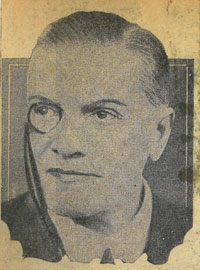 Edward Shortt
Edward Shortt
Liberal, 1919-22, in Lloyd George’s National Government
Edward Shortt was born in Byker, the son of the vicar of St Anthony’s. He was educated at Durham School, and he read classics at Durham University. He established a solid if unspectacular career as a barrister, before being elected as MP for Newcastle-upon-Tyne in the first 1910 general election (in 1918, when the seat was divided, he became MP for Newcastle West). Apart from Irish home rule (he was of Irish descent), he made little impact in the Commons, and would probably have been destined for anonymity, were it not for his support for Lloyd George when he created his National Government in 1916.
He finally made a name for himself as chairman of the select committee looking into the implementation of conscription. When, the following year, the government were looking to introduce conscription into Ireland, he was thus made chief secretary for Ireland. As such, he was responsible for the arrest of 150 Sinn Féinners in response to the so-called German Plot. He also sought to reach agreement over conscription and even, in talks with Catholic hierarchy, envisaged some Irishmen being allowed to be conscripted into the French army, rather than the British. In the end, conscription was never introduced.
The notion that the politicians of 1914 unfeelingly despatched young men to their deaths, safe from the horrors of war never made much sense: like Asquith and Bonar Law, Shortt knew the tragedy of losing a son, when he lost his in the Third Ypres.
The Coupon Election of 1918 saw Lloyd George with relatively few Liberals of the seniority required for high office and thus, when Sir George Cave left the Home Office, Shortt was made home secretary, to give the Lloyd George Liberals at least one of the great offices of state. He faced two police strikes in 1919, both of which he managed to resolve effectively. He also faced the issue of repatriating interned enemy aliens to Austria and Germany, though he allowed many thousands to remain. He was also more inclined to grant mercy than many home secretaries did. He was not a good performer in the House, and perhaps failed to master his brief at times; he was also somewhat prone to appoint north-easterners.
When Lloyd George fell in 1922, Shortt retired from active politics. He held a series of positions, notably becoming the second chairman of the British Board of Film Censors, despite having little interest in movies, and actively disliking talkies (and being pretty sniffy about Hollywood). He was an enthusiastic censor: in 1931 alone, he banned 35 films (a record). He also introduced a new rating, H (for horror), the origin of the later X rated film. One daughter, Nora, was the board’s script reader from 1934; another, as Doreen Ingrams, became a widely published expert on the Arab world.
Shortt’s political career was short in duration and short on achievement, in truth. However, he offered a steady hand in a turbulent time.
Here’s a 1922 pencil sketch:
